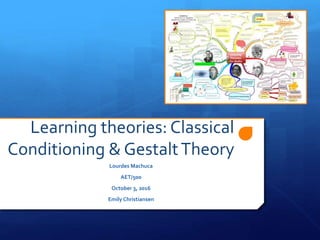Learning Theories: Classical Conditioning & Gestalt Theory
•Descargar como PPTX, PDF•
7 recomendaciones•3,287 vistas
Definition, history and application of Classical Conditioning & Gestalt Theory.
Denunciar
Compartir
Denunciar
Compartir

Recomendados
Recomendados
Más contenido relacionado
La actualidad más candente
La actualidad más candente (20)
Destacado
Destacado (20)
Adult learning theoriespmtaadultlearning class Framingham

Adult learning theoriespmtaadultlearning class Framingham
Validity and Significance of Course Content, Consistency with Social Reality,...

Validity and Significance of Course Content, Consistency with Social Reality,...
Intelligent Adaptive Learning: A Powerful Element for 21st Century Learning &...

Intelligent Adaptive Learning: A Powerful Element for 21st Century Learning &...
Similar a Learning Theories: Classical Conditioning & Gestalt Theory
Similar a Learning Theories: Classical Conditioning & Gestalt Theory (20)
Learning_Theories explained copyright -Michelle Mckoy

Learning_Theories explained copyright -Michelle Mckoy
Schools of Psychology - Structuralism, Functionalism, Behaviorism, Gestalt Ps...

Schools of Psychology - Structuralism, Functionalism, Behaviorism, Gestalt Ps...
Educational philosophies BELANO -ISAAC REPORT.pptx

Educational philosophies BELANO -ISAAC REPORT.pptx
Summary chapter 1 of psychology of language teachers [updated]![Summary chapter 1 of psychology of language teachers [updated]](data:image/gif;base64,R0lGODlhAQABAIAAAAAAAP///yH5BAEAAAAALAAAAAABAAEAAAIBRAA7)
![Summary chapter 1 of psychology of language teachers [updated]](data:image/gif;base64,R0lGODlhAQABAIAAAAAAAP///yH5BAEAAAAALAAAAAABAAEAAAIBRAA7)
Summary chapter 1 of psychology of language teachers [updated]
Último
Mehran University Newsletter is a Quarterly Publication from Public Relations OfficeMehran University Newsletter Vol-X, Issue-I, 2024

Mehran University Newsletter Vol-X, Issue-I, 2024Mehran University of Engineering & Technology, Jamshoro
Último (20)
Exploring_the_Narrative_Style_of_Amitav_Ghoshs_Gun_Island.pptx

Exploring_the_Narrative_Style_of_Amitav_Ghoshs_Gun_Island.pptx
This PowerPoint helps students to consider the concept of infinity.

This PowerPoint helps students to consider the concept of infinity.
Salient Features of India constitution especially power and functions

Salient Features of India constitution especially power and functions
General Principles of Intellectual Property: Concepts of Intellectual Proper...

General Principles of Intellectual Property: Concepts of Intellectual Proper...
On National Teacher Day, meet the 2024-25 Kenan Fellows

On National Teacher Day, meet the 2024-25 Kenan Fellows
Micro-Scholarship, What it is, How can it help me.pdf

Micro-Scholarship, What it is, How can it help me.pdf
Unit 3 Emotional Intelligence and Spiritual Intelligence.pdf

Unit 3 Emotional Intelligence and Spiritual Intelligence.pdf
HMCS Max Bernays Pre-Deployment Brief (May 2024).pptx

HMCS Max Bernays Pre-Deployment Brief (May 2024).pptx
Python Notes for mca i year students osmania university.docx

Python Notes for mca i year students osmania university.docx
Learning Theories: Classical Conditioning & Gestalt Theory
- 1. Learning theories: Classical Conditioning & GestaltTheory Lourdes Machuca AET/500 October 3, 2016 Emily Christiansen
- 2. What is a leaning theory? Learning is an important part of the educational process. Learning happens without and effort and it is present even in our every-day activities. Throughout the time, there have been many psychologists and philosophers studying the nature of learning and they have come out with different theories to try to explain it. A learning theory is an explanation or model that describes how information is absorbed, processed and retained during learning.
- 3. Behaviorist and CognitivistTheories Behaviorism Overview Its principal is stimulus- response. Positive or Negative reinforcement. Learner is passive. Learning defined as “a change of behavior in the learner”. Cognitivism Overview In this theory, the learner is an information processor. Learning goes beyond external; it is and internal process. Cognitivism replaced behaviorism in the 1960s as the dominant paradigm. The learner has the control of the process.
- 4. Classical Conditioning & GestaltTheory Behaviorism Cognitivism
- 5. Classical Conditioning It is also known as Pavlovian (as its researcher last name: Ivan Pavlov) or respondent conditioning. It is a reflexive or automatic type of learning.
- 7. History and theorist of Classical Conditioning First studied by Ivan Pavlov through experiments with dogs (Pavlov’s dogs, 1920s). This theory became the foundation of behaviorism. John B.Watson applied Pavlov’s model to human beings in 1921. Watson’s experiment concluded that the classical conditioning model could cause some phobias in humans.
- 8. Learning Settings and Mode of Delivery Consistent and repetitive stimuli from teacher to students. Classical conditioning can be used to teach students what is expected from routine activities’ like clapping 2 times to get students attention. Use of rewards is encouraged. Instructor-led of one-on- one or small group settings. Computer-based learning.
- 9. Gestalt theory Gestalt is a German word that means pattern or form. Gestalt theorists propose that the experiences and perceptions of learners have a significant impact on the way that they learn. This theory attempts to describe how people tend to organize visual elements into groups or unified wholes when certain principles are applied. (Koffka,2013) The human brain maps learning features to understand the whole, instead of the sum of its parts .
- 11. History and theorist of Gestalt theory The term “Gestalt” was created by German theorist Graf Christian von Ehrenfels who said that learning takes place as students were able to comprehend a concept in its entirety, rather than broken up into parts (Ehrenfels, 1937). Max Wertheimer was one of Ehrenfels’ students and with his two assistants Wolfgang Köhler and Kurt Koffka studied the use of a tachistoscope and its effects.
- 12. Learning Settings and Mode of Delivery As an instructor, deliver a holistic lesson. Harmony in the classroom is important so that the students will be comfortable exchanging ideas. Teachers should encourage their students to discover the relationship of the elements that make up a problem Experiments or laboratory sessions are activities that can be used as a discovery method. A traditional classroom environment will allow student to interact and exchange ideas. Self-study is also encouraged. Small or large group settings mediated by an instructor. Computer-based simulations. Workshops, role plays.
- 13. References LearningTheories. (2005-2016). Retrieved from https://www.learning-theories.com/ Wikipedia. (2016). Retrieved from https://en.wikipedia.org/wiki/Classical_conditioning Ehrenfels, C.V. (1937). On Gestalt-qualities. Psychological Review, 44(6), 521. Shippensburg University. (2000). Retrieved from http://webspace.ship.edu/cgboer/gestalt.html
